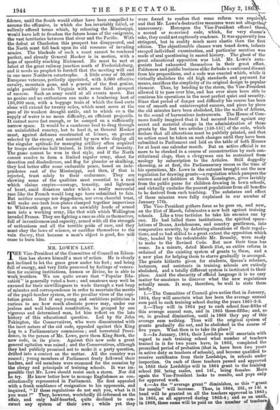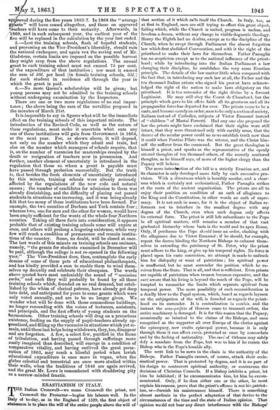MR. LO WE'S LAST. T HE Vice-President of the Committee of
Council on Educa- tion has shown himself a man of action. He is clearly not inclined to let the grass grow under his feet ; and being full of energy, and very little possessed by feelings of venera- tion for existing institutions, human or divine, he is able to work wonders. We. are quite aware that "Popular Edu- cation" is generally voted a bore ; and amateurs may well be excused for their unwillingness to wade through a vast heap of minutes and correspondence in order to ascertain the merits of the pupil-teacher system, or the peculiar vices of the capi- tation grant. But it' any young and ambitious politician is curious to see how much absolute power may, under our jealous and well balanced constitution, be grasped by one vigorous and determined man, let him reflect on the late history of this educational question. Led by Sir John Pakington, the Conservatives, who were discontented with the inert nature of the old code, appealed against this King Log to a Parliamentary commission ; and terrestrial Provi- dence, in the person of Mr. Lowe, gave them King Stork, the new code, in its place. Against this new code a great general agitation was raised ; and the Conservatives, although they had publicly promised not to make it a party question, drifted into a contest on the matter. All the country was roused ; young members of Parliament freely followed their leaders, and old members were crammed for the occasion by the clergy and principals of training schools. It was im- possible that Mr. Lowe should resist such a storm. Nor did he try. He knew better how to manage Englishmen as con- stitutionally represented in Parliament. He first appealed with a frank semblance of resignation to his opponents, and inquired, " If these regulations do not suit you, what is it you want ?" They, however, wretchedly ill-informed on the affair, and only half-hearted, quite declined to con- struct any system of their own ; while yet they were forced to confess that some reform was requirt , and that Mr. Lowe's destructive measures were not altogethOkr unnecessary. Hereupon the Vice-President offered them a second or re-revised code, which, for very shame's sake, they could not captiously condemn. It was apparently less stringent, but in reality much more elastic than the first edition. The objectionable clauses were toned down, infants escaped individual examination, and particular mention was made of oral queitioning in sacred history. The ghost of the great educational opposition. was laid. Mr. Lowe's "anta- gonists had exhausted theniselves in their great effort. Politeness and public business alike forbade a continued dissent- from his propositions, and a code was enacted whieli, while it virtually abolishes the old high standards and payment. for means, sacrifices the simplicity of its original design to popular' clamour. Thus, by bending to the storm, the Vice-President allowed it to pass over him, and has ever since been able to continue his operations in the most perfect quiet and security. Since that period of danger and difficulty his course has been one of smooth and uninterrupted success, and piece by piece. the old minutes have been abolished, like the walls of Athehs, to the sound of harmonious instruments. The House of Com- mons fondly imagined that it had secured itself against any secret and material change in the administration of these grants by the last two articles (150-151) of the code, which declare that all alterations must be publicly printed, and that no action must be taken on such changes until they have been submitted to Parliament and laid on the table of both Houses- for at least one calendar month. But an active official is no more to be checked in a course of reconstruction by such con- stitutional clogs, than a clergyman can be restrained from ' neology by subscription to the Articles.- Still doggedly- choosing, as at first, the Parliamentary recess as the timo of his operations, Mr. Lowe in the autumn brought out the new regulation for drawing grants—a regulation which pampers the-' science and art dabblers at South Kensington, gives lavishly from the public purse for children drawing in town schools, and virtually excludes the poorest populations from all benefits- to be derived from such teaching. The substance and effect of these minutes were fully explained in our number of January 17th. The Vice-President gathers force as he goes on, and now,_ on the 21st of March, fulminates a new bolt against training schools. Like a true tactician he take his enemies one by one. He had lulled these institutions, the spirited specu- lations of Deans, Archdeacons, and country gentlemen, into. comparative security, by deferrinea alterations of their regula- tions, and so had stilled to a great extent the oppositicai which they, headed by the redoubtable Mr. Brumby, were ready to make to the Revised Code. But now their time has come. In a minute, dated March 21st, an entire reform is ordained of the existing system of grants to them, and a a new plan for helping them to starve gradually is arranged. The grants hitherto given for students, Queen's scholars,. lecturers, and assistants in training. schools are entirely abolished, and a totally different system is instituted in their place. Amid the obscurity of official language it is no easy matter for amateurs to discover what the new regulations actually mean. It may, therefore, -be well to state them briefly. 1.—The Committee of Council give notice that in January, 1864, they will ascertain what has been the average annual sum paid to each training school during the years 1861-2-3. 2.—They will in 1864 pay to each school four-fifths of this average annual sum, and in 1865 three-fifths; and, so- on, in gradual diminution, until in 1868 they pay of this- average sum nothing. Thus will the original system of grants gradually die out, and be abolished in the course of five years. What then is to take its place ? - 3.—In January, 1864, their Lordships will ascertain with regard to each training school what number of teachers trained in it for two years have, in 1863, completed the prescribed period of probation (that is, have been two years in active duty as teachers of schools), and become qualified to receive certificates from their Lordships, in schools under inspection. On each of these teachers passed and approved_ in 1863 their Lordships will in 1864 grant to the training school 201. being males, and 141., being females. Here again the Vice-President looks to results, and pays only for approved work. 4.—As the " average grant " diminishes, so this " grant- for results" will increase. Thus, in 1864, 201., or 141. a head will be granted on all the teachers approved in 1863; in 1865, on all approved during 1863-4 ; and so on until,. , j askin 1868, these sums will be paid on the number of teach
apF roved during the five years 1863-7. In 1868 the "average ts " will have ceased altogether, and those on approved
hers will have come to their maturity. Afterwards, in /11869, and in each subsequent year, the earliest year of the five will be replaced in the calculation by the year last ended.
5.--Lest the training schools, flush of hopeful students, and presuming on the Vice-President's liberality, should ruin the national exchequer, and again vex the saving soul of Mr. Gladstone, certain limits are imposed on the possible harvest they might reap from the above regulations. The annual grant to each training school must not exceed 75 per cent. of the expenditure of that institution ; nor must it exceed the sum of 501. per head (in female training schools, 351.) for each student in residence all through the year in which the grant is paid.
6.—No more Queen's scholarships will be given; but young persons may not be admitted to the training schools without undergoing examination by the Inspectors.
There are one or two more regulations of no real impor- tance ; the above being the sum of the novelties proposed in the minutes of March 21st.
It is impossible to say in figures what will be the immediate effect on the traininet' schools of this important minute. The introduction of the Revised Code, as well as the nature of these regulations, must make it uncertain what sum any one of these institutions will gain from Government in 1864, or the next year. For, as shown above, it will depend, not only on the number which they admit and train, but also on the number which managers of schools require, that is, on the number of vacancies for masterships created by the death or resignation of teachers now in prossession. And further, another element of uncertainty is introduced in the regulation that those on whom a grant is payable must have passed through probation successfully. But the truth is, that besides the fresh elements of uncertainty introduced by this minute, training schools were already seriously affected by the regulations of the new code and natural causes ; the number of candidates for admission to them was already diminishing, and the difficulty of placing out passed students in situations was increasing, and it was being already felt that too many of these institutions have been formed. For example, the two counties of Durham and York contain four ; whereas two, one for men and the other for women, would have been amply sufficient for the wants of the whole four Northern counties. Taking all these facts into consideration, it appears probable that of existing training schools some will expire at once, and others will prolong a lingering existence, while very few will reach a condition of permanence and remain institu- tions of the country. Some, no doubt, will be closed at once. 'The last words of this minute on training schools are ominous, namely, "the grants for students examined in December will be paid, although the college is not re-opened in the following year." The Vice-President does, then, contemplate the early demise of some of these pets of educational philanthropists, and has kindly provided a sum to enable them to wind them- selves up decently and celebrate their obsequies. The words above quoted have most undeniably the sound of " novissima .verba,' and such they will probably be found by all those training schools which, founded on no real demand, but estab- lished by the whim of clerical patrons, have already got deep into debt, and anticipated for years to come grants which were -only voted annually, and are to be no longer given. We -wonder what will be done with those commodious buildings, no longer resounding with the voices of lecturers, assistants, and principals, and the first efforts of young students on the harmonium. Other training schools will drag on a precarious existence, feeding on the supply of pupil-teachers already ap- prenticed, and filling up the vacancies in situations which yet re- main, until these last helps being withdrawn, they, too, disappear and are forgotten. A few, a select few, purified in the flame .of tribulation, and having passed through sufferings more .easily imagined than described, will emerge in a condition of comparative vitality, and having outlived the great perse- cution of 1863, may reach a blissful period when lavish educational expenditure is once more in vogue, when the globes celestial and terrestrial are once more studied within their walls, when the traditions of 1846 are again revived, -and the great Mr. Lowe is remembered with shuddering pity as a narrow-minded fanatic.































 Previous page
Previous page